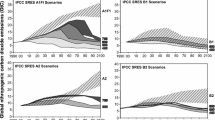Abstract
This chapter applies the ethical framework developed so far to the complex of climate and development policies. The central message is that mitigation, adaptation and development should not be considered as three separate and conflicting aims but much more as three aspects of one climate-compatible development strategy. Considerations of risks are integrated by the demand to maximize the likelihood of every person possessing the preconditions of a human dignified live. While the financial, technological, and institutional capacity of nations emerges as a central criterion for burden sharing, in practice various schemes of distribution of emission rights and the costs of adaptation and development are compatible with the basic approach defended here. The ethical principles outlined here do not suffice to determine “the one” correct policy in the specific areas considered here: Remaining tensions, including the treatment of risk, are to be resolved in open and transparent debate and mechanisms of decision making respecting the requirements of fair procedures outlined in Chap. 7, including the demands of subsidiarity.
Access this chapter
Tax calculation will be finalised at checkout
Purchases are for personal use only
Similar content being viewed by others
References
Baer, P., & Athanasiou, T. (2007). Frameworks & proposals: A brief, adequacy and equity-based evaluation of some prominent climate policy frameworks and proposals (Global Issue Papers No. 30). Berlin: Heinrich Böll Stiftung.
Biermann, F., & Boas, I. (2008). Protecting climate refugees: The case for a global protocol. Environment, 50(6), 8–16.
Comim, F. (2008). Climate injustice and development: A capability perspective. Development, 51, 344–349.
Gardiner, S. M. (2006a). A core precautionary principle. The Journal of Political Philosophy, 14(1), 32–60.
Gardiner, S. M. (2006b). A perfect moral storm: Climate change, intergenerational ethics and the problem of moral corruption. Environmental Values, 15(3), 397–413.
IPCC. (2007a). Climate change 2007: The physical science basis. Contribution of Working Group I to the Fourth Assessment Report of the Intergovernmental Panel on Climate Change. Cambridge: Cambridge University Press.
IPCC. (2007b). Climate change 2007: Impacts, adaptation and vulnerability. Contribution of Working Group II to the Fourth Assessment Report of the Intergovernmental Panel on Climate Change. Cambridge: Cambridge University Press.
Klasen, S. (2004). In search of the Holy Grail: How to achieve pro-poor growth? In B. Tungodden, N. Stern, & I. Kolstad (Eds.), Toward pro-poor policies: Aid, institutions, and globalization (pp. 165–195). New York: Oxford University Press.
Manson, N. A. (2002). Formulating the precautionary principle. Environmental Ethics, 24, 263–274.
Mavrotas, G., & Shorroks, A. (Eds.). (2007). Advancing development: Core themes in global economics. New York: Palgrave Macmillan.
Miller, D. (2008). Global justice and climate change: How should responsibilities be distributed? The Tanner Lectures on Human Values. From http://www.tannerlectures.utah.edu/lectures/documents/Miller_08.pdf. Accessed on 5 May 2012.
Nida-Rümelin, J. (1996). Ethik des Risikos. In J. Nida-Rümelin (Ed.), Angewandte Ethik: Die Bereichsethiken und ihre theoretische Fundierung: Ein Handbuch (pp. 806–830). Stuttgart: Kröner.
Pogge, T. (2004). World poverty and human rights: Cosmopolitan responsibilities and reforms. Cambridge: Polity Press.
Posner, E. A., & Sunstein, C. R. (2008). Justice and climate change (Harvard Project on International Climate Agreements Discussion Paper 08–04). From http://belfercenter.ksg.harvard.edu/publication/18553/justice_and_climate_change.html. Accessed on 5 May 2012.
Robb, C. M. (2002). Can the poor influence policy? Participatory poverty assessments in the developing world (2nd ed.). Washington, DC: The World Bank.
Spaemann, R. (1979). Technische Eingriffe in die Natur als Problem der politischen Ethik. Scheidewege, 9, 476–497.
Author information
Authors and Affiliations
Corresponding author
Editor information
Editors and Affiliations
Rights and permissions
Copyright information
© 2012 Springer Science+Business Media Dordrecht
About this chapter
Cite this chapter
Gösele, A., Wallacher, J. (2012). Criteria for Compatibility of Climate and Development Policies. In: Edenhofer, O., Wallacher, J., Lotze-Campen, H., Reder, M., Knopf, B., Müller, J. (eds) Climate Change, Justice and Sustainability. Springer, Dordrecht. https://doi.org/10.1007/978-94-007-4540-7_9
Download citation
DOI: https://doi.org/10.1007/978-94-007-4540-7_9
Published:
Publisher Name: Springer, Dordrecht
Print ISBN: 978-94-007-4539-1
Online ISBN: 978-94-007-4540-7
eBook Packages: Earth and Environmental ScienceEarth and Environmental Science (R0)




